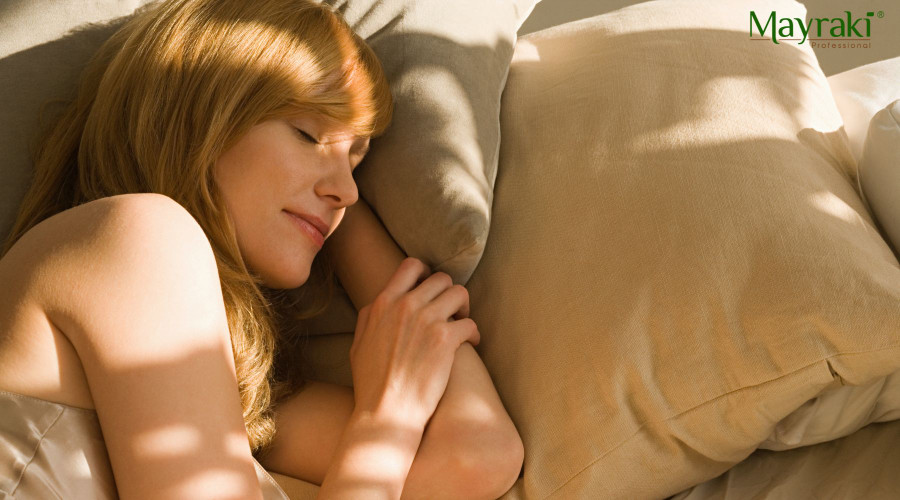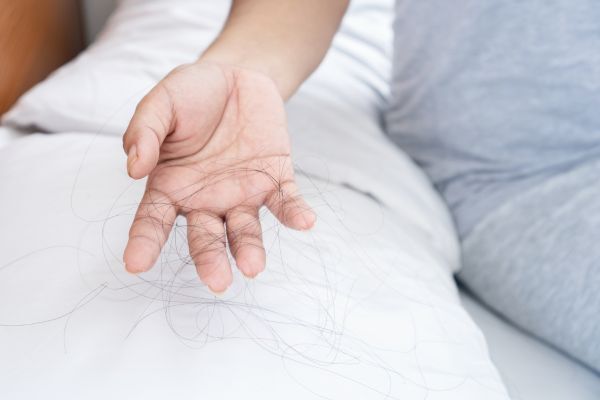The Impact of Sleep Patterns on Hair Color and Health
Apr 02, 2025 | By Maria Eliza Pineda

Sleep is a crucial aspect of our overall health. It directly affects not only our energy and mood but also overall appearance and hair. The quality of sleep plays a significant role in hair health, color, and growth. Let’s discuss all the ways sleep can affect the health of your hair and how you can manage your sleep to improve your hair’s appearance and health.
The Science Behind Sleep and Hair Health
Hair goes through a growth cycle consisting of three phases: anagen (active growth), catagen (transition), and telogen (resting and shedding). During this process, the body undergoes cellular repair and regeneration, where sleep plays a vital role.
Sleep also affects hormone regulation, including cortisol and melatonin. High cortisol levels, caused by lack of sleep, can lead to hair thinning and increased hair loss. Meanwhile, melatonin, a natural antioxidant released at night, helps protect hair follicles from oxidative stress and supports hair pigmentation.
Sleep Patterns and Hair Pigmentation
Melanin is the pigment the body produces that is responsible for the color of hair. Its production can be affected by sleep deprivation. Insufficient rest can lead to an imbalance in melanin production, causing premature graying or loss of the hair’s natural shine.
People with irregular sleep patterns may experience faster changes in hair color due to a lack of melanin production. The good news is that natural hair color can be maintained or restored through adequate and quality sleep.
Increased Hair Loss Due to Sleep Deprivation

High levels of the stress hormone cortisol can contribute to hair loss. When the body is continuously in a state of stress due to lack of sleep, hair follicles may enter the telogen phase earlier than usual, resulting in excessive hair shedding.
Weakening of Hair Strands and Loss of Shine
Lack of rest can lead to hair becoming thinner and more prone to breakage. Since the body does not have enough time to repair damaged cells, hair can become brittle and lose its natural vibrancy and shine. The hair can look dull and start falling out because of this.
Scalp Issues Due to Insufficient Sleep
Inadequate sleep can cause dryness, itchiness, and other scalp issues that may lead to hair thinning and dandruff. Sleep deprivation can affect the production of natural oils in the scalp, which are essential for maintaining hair moisture and nourishment. Sleep also wreaks havoc on hormones and health that could deplete the health of the scalp and increase hair loss.
The Importance of a Regular Sleep Schedule
Irregular sleep patterns can disrupt the body's circadian rhythm, directly impacting hair health. The circadian rhythm plays a role in regulating the hair growth cycle and melanin production. Maintaining a consistent sleep schedule supports overall hair health, keeping it thick, shiny, and strong.
Ways to Improve Sleep and Enhance Hair Health

Establish a Consistent Sleep Routine
Avoid staying up late and ensure sufficient sleep each night. Setting a regular bedtime and setting an alarm in the morning helps the body adapt to a proper sleep-wake cycle. Keep your day occupied and active so that you are tired enough to be able to sleep at night.
Create a Sleep-Conducive Environment
Use a comfortable bed, turn off the lights, and minimize noise to achieve deep sleep. Play music or white noise that will help your mind calm down and use aromatherapy to relax. A calm and relaxing bedroom environment helps improve sleep quality.
Use Relaxation Techniques
Meditate or read a book before bedtime to lower stress levels. Relaxation techniques such as deep breathing exercises and aromatherapy can contribute to better sleep.
Limit Screen Time
Avoid using mobile phones or other electronic devices at least an hour before bed to prevent blue light exposure, which can disrupt melatonin production. Blue light from screens can interfere with the body’s natural process of preparing for sleep.
Mayraki Anti-Grey Hair Color Restoring Treatment: A Solution for Premature Graying

The Mayraki Anti-Grey Hair Color Restoring Treatment is a natural and effective product that helps restore the hair's natural color. Formulated with antioxidant-rich ingredients, it strengthens hair follicles and improves melanin production. It harnesses the power of polygonum multiflorum and other powerhouse ingredients that work together to induce melanin production in the hair and reverse the aging process in the hair.
Sleeping Beauty
Sleep is a human function that’s essential to maintaining your health and appearance, including your hair. From melanin regulation to hair strand strength, getting enough rest is an essential part of hair care. If you find that you are having issues with your hair and scalp and you’re not getting enough sleep lately, that may be the reason. By following proper sleep habits and using natural products like the Mayraki Anti-Grey Hair Color Restoring Treatment, you can keep your hair healthy, thick, and naturally vibrant.




